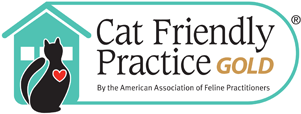The month of April is Heartworm Awareness Month and as heartworm season approaches, it is important to understand the significance of heartworm disease in our cats and the importance of prevention. Every spring, we consistently test our canine family members for heartworm disease and we ensure to give them monthly heartworm prevention, but what about our feline family members? Do we need to be worried about our cats being infected with heartworm as well? The answer is yes. Heartworm disease is also a very serious and fatal disease among cats in North America and other parts of the world just as it is in dogs. Cats are far less likely than dogs to be infected by heartworm since the dog is the natural host for heartworms. Despite this, diagnoses of feline heartworm have been on the rise in both outdoor and indoor cats. In fact, one study showed that 25% of cats infected with heartworm disease were indoor only cats. Guelph Veterinary Clinics would like you to know these important facts about Heartworm.
Heartworm Disease in Cats
Heartworm disease is caused by a roundworm parasite called Dirofilaria Immitis. These worms are about a foot long as mature adults and live in the heart, lungs and associated blood vessels in our pets. In cats, adult heartworms can also migrate to other area of the body. Heartworm is transmitted by cats through a bite from an infected mosquito that is carrying the heartworm larvae called microfilaria. A mosquito becomes a carrier of the heartworm microfilaria after it takes a blood meal from an animal that is already infected with adult heartworms. When a cat is bitten by the mosquito, infected microfilaria is then is able to enter the new host cat through the bite wound. Once the microfilaria is in the new feline host, the microfilaria will mature into adult heartworms in the heart within 6 months of the infection. Adult heartworms can then live up to two to three years in our cats. Cats infected with adult heartworms typically have just one to three worms, compared to several hundred worms in which a dog can have in their bodies at one time. Some cats infected with heartworm disease may not even have any active adult heartworms in their bodies at all.
Common Symptoms of Heartworm Disease in Cats
Heartworm disease is more difficult to detect in our feline family members than it is in dogs since cats are much less likely to have adult forms of heartworm in the body. In fact, most of the time, Heartworm is misdiagnosed in cats as feline asthma as a result of some similar symptoms. A cat infected with Heartworm may present with the following symptoms:
- Coughing
- Asthma-like Attacks
- Periodic Vomiting
- Lack of Appetite
- Weight Loss
- Difficulty Walking
- Experiencing Fainting or Seizures
- Fluid Accumulation in the Abdomen
- Sudden Collapse
Heartworm Treatment in Cats
Unfortunately, at this time, there is no approved drug therapy to treat heartworm disease in cats. There is an approved drug commonly used to treat heartworm in dogs, but it is not safe to use in cats. In fact, if a cat is treated with this drug, it will lead to death of the adult heartworms which will cause sudden anaphylaxis in the cat. If a cat is diagnosed with heartworm disease, it can be managed with good veterinary care and a long-term management plan.
Heartworm Prevention in Cats
Since there is currently no approved treatment for feline heartworm disease, prevention of heartworm is the best form of treatment. Veterinary clinics in Guelph recommend using a topical treatment such as revolution to prevent heartworm disease in your cats. Revolution is applied directly to your cat’s skin once a month. It is important to note that the dose of your cat’s monthly heartworm preventative is based on body weight and it can be started in kittens as early as 6 weeks of age. You and your feline friends will be happy to hear that Revolution, not only prevents heartworm disease in cats, but also helps manage fleas, ear mites, roundworms and hookworms as well. Ensure to speak with your Guelph Veterinary clinic today about using Revolution as heartworm prevention for your cats.


